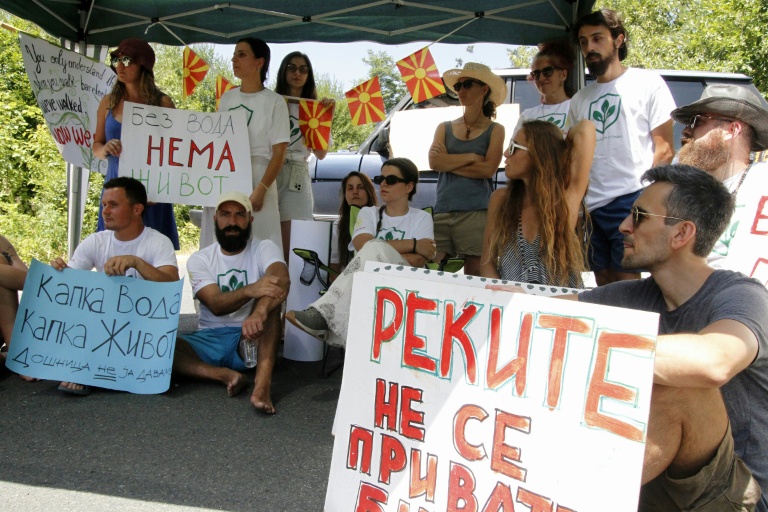Business
Activists Block Roads to Hydro Plants in North Macedonia

In North Macedonia, environmental activists have intensified their protests against small hydropower projects, blocking access to construction sites on Mount Kozuf for over a month. The activists are contesting the development of two proposed hydroelectric plants by Hydro Dosnica, arguing that these projects threaten one of the last healthy river ecosystems in the country. “Until the licenses are cancelled and all machines are removed from the river Dosnica, we will not move,” stated environmental activist Marina Tomova at her campsite near the Greek border.
Opponents of the hydro projects fear that the construction will irreparably damage the river ecosystem, particularly as the region grapples with decreasing rainfall and rising temperatures. Hydro Dosnica has denied these allegations, asserting that its operations adhere to environmental standards. The company has expressed its willingness to engage with environmental experts regarding any concerns raised.
Hydropower Development and Environmental Concerns
The push for hydropower in the Balkans has attracted significant investment, spurred by government subsidies. According to a report from conservation groups EuroNatur and Riverwatch, there are currently approximately 1,800 hydropower plants in the region, with over 3,000 more planned. Most of these projects are small-scale, like those proposed for the Dosnica River. Protests have emerged in response to these developments, highlighting the ecological risks and potential negative impact on local communities.
North Macedonia currently operates around 125 small hydropower plants, with plans to increase this number significantly. Developers are required by law to ensure that at least 10 percent of the river’s flow remains natural. Nonetheless, protesters claim that Hydro Dosnica has violated this requirement by illegally clearing forested areas, which they argue could lead to the river’s extinction. Protester Kiril Ruzinov emphasized that the river’s flow diminishes in summer, stating, “It is too small; it cannot fill a tenth of the pipe. If it is put into a pipe, the whole riverbed will be extinct.”
Challenges from Climate Change
Climate change poses additional challenges for hydropower generation globally. A study released in 2023 warned that climate change could reduce annual hydropower generation in certain river basins, including those starting in North Macedonia, by as much as 52 percent by 2050. This could have a particularly severe impact on Albania, a country heavily reliant on hydropower.
Despite the environmental concerns, the North Macedonian government recently extended Hydro Dosnica’s development license until April 2026. The government has stated that it is “closely monitoring public reactions” and is open to dialogue with stakeholders. Environmental group Changemakers4All has called for an end to what they describe as “devastating projects.” “We are not backing down, and we will stay to protect Dosnica and Kozuf,” said Risto Kamov from the organization.
The Dosnica River is considered one of the few remaining rivers in North Macedonia that is clean enough for drinking. It is home to several protected species, and the environmental non-profit Eko Svest has appealed to the government for official protection of the river. As tensions between developers and activists continue to mount, the future of the Dosnica River hangs in the balance.
-

 Politics4 weeks ago
Politics4 weeks agoSecwepemc First Nation Seeks Aboriginal Title Over Kamloops Area
-

 World5 months ago
World5 months agoScientists Unearth Ancient Antarctic Ice to Unlock Climate Secrets
-

 Entertainment5 months ago
Entertainment5 months agoTrump and McCormick to Announce $70 Billion Energy Investments
-

 Science5 months ago
Science5 months agoFour Astronauts Return to Earth After International Space Station Mission
-

 Lifestyle5 months ago
Lifestyle5 months agoTransLink Launches Food Truck Program to Boost Revenue in Vancouver
-

 Technology3 months ago
Technology3 months agoApple Notes Enhances Functionality with Markdown Support in macOS 26
-

 Lifestyle3 months ago
Lifestyle3 months agoManitoba’s Burger Champion Shines Again Amid Dining Innovations
-

 Top Stories2 months ago
Top Stories2 months agoUrgent Update: Fatal Crash on Highway 99 Claims Life of Pitt Meadows Man
-

 Politics4 months ago
Politics4 months agoUkrainian Tennis Star Elina Svitolina Faces Death Threats Online
-

 Sports5 months ago
Sports5 months agoSearch Underway for Missing Hunter Amid Hokkaido Bear Emergency
-

 Politics5 months ago
Politics5 months agoCarney Engages First Nations Leaders at Development Law Summit
-

 Technology5 months ago
Technology5 months agoFrosthaven Launches Early Access on July 31, 2025











